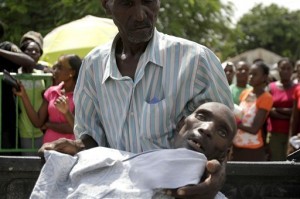 On top of the utter destruction wrought upon the island nation of Haiti by this year’s earthquake, a cruel new misfortune is adding to the misery. Hundreds of thousands of displaced Haitians, people whose homes were destroyed in quake, are living in squalid conditions in temporary tent camps. Without adequate access to clean water or sufficient medical supplies, an epidemic of Cholera has broken out. BoingBoing blogger, Maggie Baker explains what Cholera is and does:
On top of the utter destruction wrought upon the island nation of Haiti by this year’s earthquake, a cruel new misfortune is adding to the misery. Hundreds of thousands of displaced Haitians, people whose homes were destroyed in quake, are living in squalid conditions in temporary tent camps. Without adequate access to clean water or sufficient medical supplies, an epidemic of Cholera has broken out. BoingBoing blogger, Maggie Baker explains what Cholera is and does:
“The bug behind this devastation—the bacterium Vibrio cholerae—is a fascinating and frustrating creature. Fascinating, because of its role in the development of epidemiology and what we’re still learning from it. Frustrating, because it ought to be relatively simple to treat and prevent infection. We know what to do to help a cholera victim survive. All it takes is access to clean water and the most basic medical supplies. The trouble here isn’t science, it’s poverty. Cholera is, essentially, the worst food poisoning you can possibly imagine. In fact, it’s related to Vibrio vulnificus, a bacteria that tends to infect people via undercooked seafood. After you ingest the cholera bacteria, it’ll hang out in your gut for a few days before symptoms kick in. Once they do, though, cholera can kill you within hours. How? I’ll be blunt: Massive, constant diarrhea that drains the body of fluids and electrolytes and leaves victims looking like glassy-eyed, hollow-cheeked corpses before they actually are.”The problem isn’t that medical science cannot beat cholera. In fact all that’s needed to beat cholera is clean water and antibiotics. The problem is poverty – there simply isn’t enough money to ensure clean drinking water and access to simple medical treatment for the Haitian population. Over the jump is a list of places where you can contribute (even the smallest donation is HUGELY valuable) to saving the lives of people who simply shouldn’t have to die. Continue reading…
